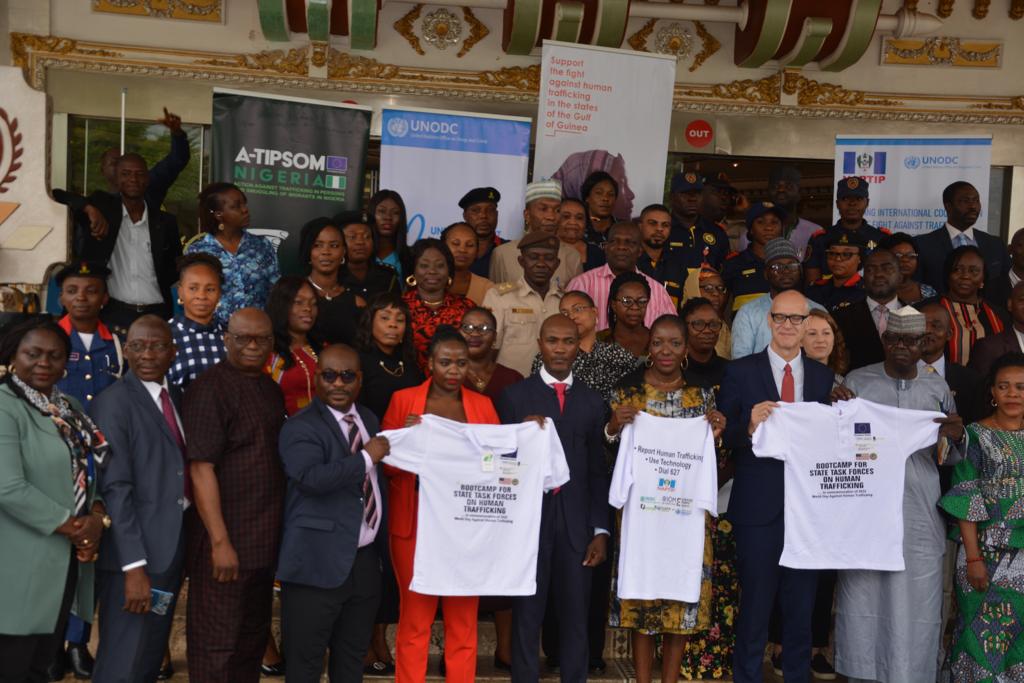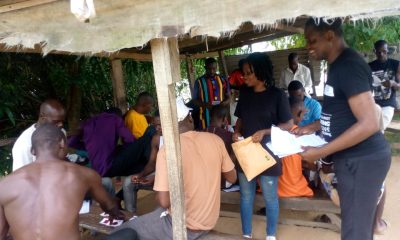FEATURED
NAPTIP, UNODC, IOM, Others Partner States To Combat Human Trafficking In Nigeria

The United Nations Office on Drugs and Crime (UNODC), International Organisation on Migration (IOM), Expertise France, International and Ibero-American Foundation for Administration and Public Policies (FIIAPP), Office of the United Nations High Commissioner for Human Rights (OHCHR), with the Nigerian government are hosting a “boot camp” for state task forces on human trafficking and the Network of Civil Society Organisations against Child Trafficking, Abuse and Labour (NACTAL).
This is part of activities organized to commemorate World Day against Human Trafficking. The theme for this year’s day against human trafficking is the use and abuse of technology.
It focuses on the role of technology as a tool that can both enable and impede human trafficking. The 2020 UNODC Global Report on Trafficking in Persons, reported that the use of the internet has been integrated into the business model of traffickers.
The expanded global usage of technology triggered by the COVID – 19 pandemic has further increased these risks, with traffickers using the internet to identify, recruit and control their victims, advertise services and launder the proceeds of their crimes.
The peer review Bootcamp is organized for the 21 states which have inaugurated task forces against human trafficking, namely Akwa-Ibom, Anambra, Benue, Borno, Cross-River, Delta, Ebonyi, Edo, Ekiti, Enugu, Jigawa, Lagos, Kaduna Kano, Katsina, Nasarawa, Ogun, Ondo, Oyo, Plateau andRivers.
The key objective of the Bootcamp is to bring together the members of the state task forces on human trafficking with the leadership of NAPTIP, relevant NGOs active in the fight against trafficking and international development partners to engage in a peer-to-peer exchange of experiences.
In his goodwill message, the Country Representative of the United Nations Office on Drugs and Crime (UNODC), Dr. Oliver Stolpe underscored the critical role of the State Task Forces. In his words, “Most of these victims, their families and communities can only be reached through communication channels at the grassroots.
Mobilizing the states, local governments and eventually communities is key. You, members of the State Task Forces are the first and most essential link in the chain needed to effectively translate the Federal Government’s policies, and most notably the recently adopted National Action Plan on Human Trafficking 2022-2026 into practical outcomes on the ground.”
Declaring the event open, the Director General of the National Agency for the Prohibition of Trafficking in Persons (NAPTIP), Dr Fatima Waziri-Azi, noted that human trafficking is a national crisis, as all states in Nigeria are affected by human trafficking.
“According to NAPTIP statistics from 2019-2022, analysis shows that 61% of human trafficking in Nigeria happens internally, that is, within the states and across state lines, 39% across our borders,” she said.
Funded by the governments of the Netherlands, Switzerland and the United States as well as the European Union, the boot camp is organized under various projects being implemented by international development partners in cooperation with NAPTIP.
-
CRIME3 years ago
PSC Dismisses DCP Abba Kyari, To Be Prosecuted Over Alleged $1.1m Fraud
-
FEATURED3 years ago
2022 Will Brighten Possibility Of Osinbajo Presidency, Says TPP
-
FEATURED2 years ago
Buhari’s Ministers, CEOs Should Be Held Accountable Along With Emefiele, Says Timi Frank
-
BUSINESS & ECONOMY2 years ago
Oyedemi Reigns As 2023’s Real Estate Humanitarian Of The Year
-
SPORTS1 year ago
BREAKING: Jürgen Klopp Quits Liverpool As Manager At End Of Season
-
SPORTS2 years ago
Could Liverpool Afford Kylian Mbappe For €200 million? Wages, Transfer Fee
-
ENTERTAINMENT2 years ago
Veteran Nigerian Musician, Basil Akalonu Dies At 72
-
FEATURED2 years ago
Tribunal Judgement: Peter Obi Warns Of Vanishing Electoral Jurisprudence, Heads To Supreme Court
-
BUSINESS & ECONOMY2 years ago
Oyedemi Bags ‘Next Bulls Award’ As BusinessDay Celebrates Top 25 CEOs/ Business Leaders
-
FEATURED3 years ago
2023 Presidency: South East PDP Aspirants Unite, Demand Party Ticket For Zone



































